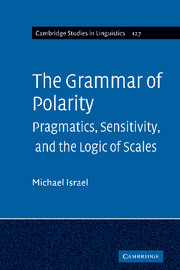Book contents
- Frontmatter
- Contents
- List of figures
- List of tables
- Acknowledgments
- List of abbreviations
- 1 Trivium pursuits
- 2 Ex nihilo: the grammar of polarity
- 3 Licensing and the logic of scalar models
- 4 Sensitivity as inherent scalar semantics
- 5 The elements of sensitivity
- 6 The scalar lexicon
- 7 The family of English indefinite polarity items
- 8 Polarity and the architecture of grammar
- 9 The pragmatics of polarity licensing
- 10 Visions and revisions
- Appendix: A catalogue of English polarity items
- Notes
- References
- General index
- Person index
7 - The family of English indefinite polarity items
Published online by Cambridge University Press: 07 September 2011
- Frontmatter
- Contents
- List of figures
- List of tables
- Acknowledgments
- List of abbreviations
- 1 Trivium pursuits
- 2 Ex nihilo: the grammar of polarity
- 3 Licensing and the logic of scalar models
- 4 Sensitivity as inherent scalar semantics
- 5 The elements of sensitivity
- 6 The scalar lexicon
- 7 The family of English indefinite polarity items
- 8 Polarity and the architecture of grammar
- 9 The pragmatics of polarity licensing
- 10 Visions and revisions
- Appendix: A catalogue of English polarity items
- Notes
- References
- General index
- Person index
Summary
We don't know a millionth of one percent about anything.
Thomas EdisonThe many splendors of any
In linguistics and philosophy it is often the little words that cause the biggest problems, and by this measure any is a very little word. Controversy over its interpretation has raged since at least the mid nineteenth century, and recently has gone all the way to the Supreme Court, where the split 5–3 decision in Small v.US (No. 03–750, 2005) turned on the precise interpretation in US statutory law of the phrase convicted in any court. Given the narrowness of this decision, there appears to be no end in sight to the dissent this one little word will occasion. Still, there may be hope for some resolution to one old persistent problem.
Any is, as Vendler put it, “a many-splendored thing” (1967: 79). The question is just how many splendors are there and how, precisely, are they related? At the most general level, the splendors of any appear to divide into two major spectra. Polarity sensitive (PS) any, as in (1), occurs almost exclusively with mass or plural nouns in the scope of a polarity licensor and lends itself to analysis as an existential quantifier. Free-choice (FC) any, as in (2), combines with singular count nouns and has a range of uses in modal, generic, and habitual contexts where it expresses a kind of reckless generalization – referring in a way that has been variously called arbitrary, random, free, or quodlibetic (e.g. in Tovena & Jayez 1999 ; Langacker 1991; Vendler 1967; and Hamilton 1858, respectively).
- Type
- Chapter
- Information
- The Grammar of PolarityPragmatics, Sensitivity, and the Logic of Scales, pp. 163 - 201Publisher: Cambridge University PressPrint publication year: 2011



